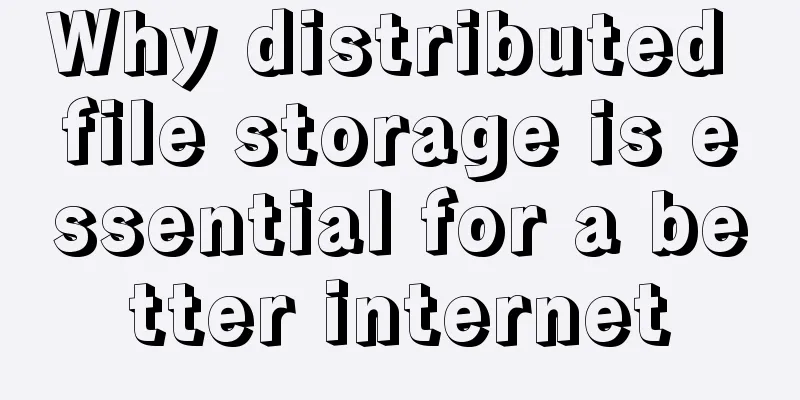Why distributed file storage is essential for a better internet

|
According to a Harvard University study, 49% of all hyperlinks cited in U.S. Supreme Court opinions are no longer valid; in addition, more than 70% of journal links in some legal journals published between 1999 and 2011 are no longer valid. As an Internet user, I believe you are familiar with the "404 error". In fact, the lifespan of web pages on the Internet today is not long. Except for web pages that are frequently maintained, the average storage lifespan of web pages on the Internet is only about 100 days. Where have all the web pages on the Internet gone ? In less than three decades, the Internet has become one of the greatest achievements in human history, bringing unprecedented developments in science, technology, and business. However, information on the internet today is addressed by location. A specific piece of content has a URL that refers to the IP address of a web server that hosts the content at a specific location. For example, if you go to a URL like https://facebook.com/mypicture.jpg, we resolve the domain name (facebook.com) to an IP address (such as 31.13.70.36), then look for the picture there. The URL then goes to 31.13.70.36 and requests the content at the path "/mypicture.jpg". The URL then points to that location, and this is why we often say that the internet today is based on domain name addressing . However, domain addressing is very inefficient. If we want to borrow a book from the library, and the librarian tells you that it is in Section 9, Bookcase 3, the top shelf, from left to right, then you have to go there to find the book . But what if someone moves the book? What if the library is closed for the day? Or will you start looking for the book from left to right when you get there? It is precisely because of the inefficiency, complexity and fragility of domain name addressing that 404 errors are always inevitable on our Internet. Decentralized storage makes the web powerful and resilient Have you ever thought that our Internet doesn't have to be constructed only with the HTTP protocol? Try to think of another way - addressing by the content of the web page instead of the domain name. Instead of using links pointing to domain names, it is better to use hash values to uniquely describe the link to the content itself, which is content addressing. The content -based addressing method separates "what" from "where", allowing data to flow through the network, so anyone can store and provide data anywhere. IPFS, as a hypermedia transmission protocol based on content addressing, allows us to exchange data using content-addressed links. In the IPFS network, the hash fingerprint of a file or data is its address. We use these hash values to identify content instead of using domain name addressing. In the IPFS network, when you try to load a file, you can retrieve it from anywhere. If the file is already on our own computer, you can retrieve it from there, and if a direct neighbor in the network has the file, you can retrieve the file from them. IPFS uses an efficient routing algorithm to search the network and can be tuned for privacy: for example, only requesting data from peers you trust . IPFS's decentralized model enables web applications to work in local networks disconnected from the original source , whether it is an office that has lost its uplink, a scientific paper hosted in various libraries, or in a remote village with poor connectivity. IPFS strengthens our digital information, making data resistant to failures of the underlying Internet, cryptographically protecting it , and making it permanent, so you and those you share data with can save a copy of the information and rely on the same link for permanent storage. IPFS solves the content addressing problem, but how do we encourage people around the world to become the backbone of this new generation of storage? Why do we need Filecoin? Filecoin is a big step forward in the way we can pay each other for storing data. Filecoin is a decentralized file storage network and protocol token that can be thought of as Airbnb for data storage. On the supply side (the mining side of the token) , individuals and organizations with unused storage space can add their disks to the Filecoin network and receive customer orders, and on the demand side ( customers) , individuals and organizations hire the Filecoin network to store their data. Filecoin draws on the latest advances in cryptography and blockchain technology to make this concept a reality. It integrates blockchain, native cryptocurrency, publicly verifiable storage proofs, storage contracts with collateral, algorithmic markets to ensure effective pricing, payment channels that allow small payments and reduce transaction costs, etc. All of these add up to a powerful, decentralized, self-healing network that can bring together large amounts of storage from "miners" around the world and provide powerful services with strong availability, elasticity and price advantages. It can automatically rebalance itself to meet demand, protect content from attacks, and recover from offline miners. There is a vast amount of unused storage in the world held by thousands of entities and millions of people. By bringing all that potential supply to the market, Filecoin could cause the price of online storage to drop dramatically. In addition, Filecoin has launched a powerful optimization process where Filecoin miners can earn money by adding more and more storage to the network. We don’t have to use Filecoin and IPFS together, but using the two together is a perfect solution to fix major failures of the current Web. Filecoin incentivizes any IPFS user to ensure that their data is stored in multiple decentralized nodes. After the Filecoin mainnet is launched, anyone can use FIL to pay a large number of decentralized storage providers to store their files robustly, thereby ensuring that their data can be provided securely and quickly to those who request them. Users who store files on IPFS and Filecoin will benefit from optimized storage costs, diversified storage providers, and faster data services. Decentralized network protects your privacy Storing private data on a network powered by IPFS and Filecoin means that parts of the data may be distributed across many computers operated by complete strangers. However, this may be better for privacy than existing cloud systems. Today, cloud storage providers of all sizes store users’ data completely in unencrypted plaintext form, and even if some have added encryption at rest, they do so by controlling the user’s encryption keys, rather than creating a true “forget it” or “zero-knowledge” system, which is very dangerous because it means customer data can be stolen, leaked, or sold by hackers or other attackers. Distributing user data across a large number of storage computers that are not owned by one company or service increases the exposure of that data. However, if valuable data is stored encrypted in an end-to-end manner, then attackers cannot learn what is inside . This is true whether the storage network is a large cloud provider or an incentivized market like Filecoin. This is a different security model, one in which we are forced to encrypt everything at all times, only allow users to access the keys, and the failure of a single cloud provider does not compromise the resiliency of the data. IPFS & Filecoin is the next wave of Internet innovation IPFS&Filecoin is the next wave of Internet innovation. We can use networks and incentive mechanisms to create a better industry . I PFS & Filecoin have the potential to change the way we organize commerce and trade value on a global scale because new market protocols create entirely new dynamics between participants and the network’s ability to create value. In the current Internet innovation model, when a company creates a network economy, they capture most of the network value, even though millions of people participate in creating value on the network, but these participants may not earn a stake in the network itself. Most long-term value is awarded to a small number of wealthy investors and early shareholders. In contrast, distributed networks are fueled by protocol tokens, where the reward for participating in a market protocol is a stake in the network, which shrinks as the value of the network increases, based on the protocol token’s percentage of the total value of the network. Networks such as Filecoin embody a new scheme whereby participants who create network value are compensated with network equity, and miners who store and distribute data on the Filecoin network are awarded Filecoin protocol tokens, which they can choose to hold or liquidate for cash. Since the Filecoin protocol token is designed to track the amount of value created by the storage network, growth in the Filecoin economy will translate into growth in the value of the token . Miners and users who choose to hold the token will share in this upside, receiving a fair reward for creating value. At the same time, the more tokens any individual participant earns and holds, the more they have to support the network and ensure its success. Market protocols represented by Filecoin are still in the early stages of development, but they have broad prospects. Let us stand at the forefront of these technological advances and work together to build a better blue sky and blue sea. For more information about IPFS and Filecoin, and for friends who want to participate in Filecoin mining, you can add Kuangge on WeChat ( WeChat ID: kuangge2018 ). |
<<: South Korean Economist Warns: New Tax Law Could Slow Crypto Market Growth
Recommend
What does a mole on a woman's nose mean?
What does it mean if a mole on the tip of a woman...
What does a mole on the back of the neck mean?
Mole physiognomy is an important part of traditio...
Whether you will be rich or not can be seen from your cheekbones
Cheekbones represent power. Generally speaking, p...
A man's palmistry love line forks, which means he is destined to be a third party.
Is it good for a man to have a forked love line o...
As “dominoes” fall one after another, where will the next “explosion point” of cryptocurrency be?
Since the beginning of this year, the tragic situ...
How does R3 prevent snoopers from front-running transactions on its blockchain?
As soon as the issue of building a blockchain is ...
What are the faces of women who have extremely unhappy marriages? Which women have unhappy marriages?
Marriage is very important for both men and women...
Which palm lines represent good fortune?
Side income is generally a more unstable type of ...
Is it true that people with slightly crooked noses are more likely to lose money?
Sometimes, even a small spot on the face may have...
What is the fate of being born in 1938?
In life, everyone has his or her own birthday des...
Fed minutes hint at discussion of tapering, Summers accuses Fed of creating "complacency" on inflation
On Wednesday afternoon, Eastern Time, the Federal...
Blockchain revolutionizes the media industry. ATMChain China Community Meeting was successfully held
On July 24 , 2017 , the "Global ATMChain Chi...
Bitcoin's growth is "far ahead", why can't Ethereum keep up
Due to the hype that a spot Bitcoin ETF may be ap...
What are the facial features of the woman who is most reliable to marry?
The most reliable woman to marry home The woman y...
What does a short love line mean?
Palmistry affects us in many ways, including our ...









